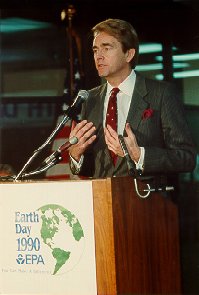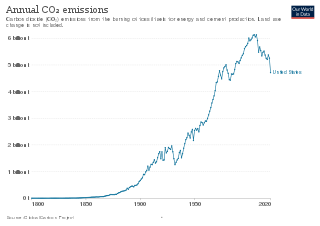
The League of Conservation Voters (LCV) is an American environmental advocacy group. LCV says that it "advocates for sound environmental laws and policies, holds elected officials accountable for their votes and actions, and elects pro-environment candidates." The organization pursues its goals through voter education, voter mobilization, and direct contributions to political candidates. LCV includes 29 state affiliates. LCV was founded in 1970 by environmentalist Marion Edey, with support from David Brower. The group's current president is Gene Karpinski. It is headquartered in Washington, D.C., and has over two million members.
Earthjustice is a nonprofit public interest organization based in the United States dedicated to litigating environmental issues. Headquartered in San Francisco, they have an international program, a communications team, and a policy and legislation team in Washington, D.C., along with 14 regional offices across the United States.

Carol Martha Browner is an American lawyer, environmentalist, and businesswoman, who served as director of the White House Office of Energy and Climate Change Policy in the Obama administration from 2009 to 2011. Browner previously served as Administrator of the Environmental Protection Agency (EPA) during the Clinton administration from 1993 to 2001. She currently works as a Senior Counselor at Albright Stonebridge Group, a global business strategy firm.

John E. Peterson is an American Republican politician from the Commonwealth of Pennsylvania. From 1997 to 2009, he represented the state's mainly rural and largely Republican 5th Congressional district in the U.S. House.

The National Wildlife Federation (NWF) is the largest private, nonprofit conservation education and advocacy organization in the United States, with over six million members and supporters, and 51 state and territorial affiliated organizations.

William Kane Reilly was Administrator of the Environmental Protection Agency under President George H. W. Bush. He has served as president of World Wildlife Fund, as a founder or advisor to several business ventures, and on many boards of directors. In 2010, he was appointed by President Barack Obama co-chair of the National Commission on the BP Deepwater Horizon Oil Spill and Offshore Drilling to investigate the oil spill in the Gulf of Mexico.

The Alliance to Save Energy is a bipartisan, nonprofit coalition of business, government, environmental, and consumer groups based in Washington, D.C. The Alliance states that it advocates for "energy-efficiency policies that minimize costs to society and individual consumers, and that lessen greenhouse gas emissions and their impact on the global climate." The Alliance's chief activities include public relations, research, and lobbying to change U.S. energy policy.
Christian views on environmentalism vary greatly amongst different Christians and Christian denominations.
Green conservatism is a combination of conservatism with environmentalism. Environmental concern has been voiced by both conservative politicians and philosophers throughout the history of conservatism. One of the most prominent early philosophers of conservatism, Edmund Burke, in his Reflections on the Revolution in France (1790), argued: "The earth, the kind and equal mother of all ought not to be monopolised to foster the pride and luxury of any men."

The environmental policy of the United States is a federal governmental action to regulate activities that have an environmental impact in the United States. The goal of environmental policy is to protect the environment for future generations while interfering as little as possible with the efficiency of commerce or the liberty of the people and to limit inequity in who is burdened with environmental costs. As his first official act bringing in the 1970s, President Richard Nixon signed the U.S. National Environmental Policy Act (NEPA) into law on New Year's Day, 1970. Also in the same year, America began celebrating Earth Day, which has been called "the big bang of U.S. environmental politics, launching the country on a sweeping social learning curve about ecological management never before experienced or attempted in any other nation." NEPA established a comprehensive US national environmental policy and created the requirement to prepare an environmental impact statement for "major federal actions significantly affecting the quality of the environment." Author and consultant Charles H. Eccleston has called NEPA the world's "environmental Magna Carta".

The American Clean Energy and Security Act of 2009 (ACES) was an energy bill in the 111th United States Congress that would have established a variant of an emissions trading plan similar to the European Union Emission Trading Scheme. The bill was approved by the House of Representatives on June 26, 2009, by a vote of 219–212. With no prospect of overcoming a threatened Republican filibuster, the bill was never brought to the floor of the Senate for discussion or a vote. The House passage of the bill was the "first time either house of Congress had approved a bill meant to curb the heat-trapping gases scientists have linked to climate change."
The American Council for an Energy-Efficient Economy (ACEEE) is a nonprofit, 501(c)(3) organization. Founded in 1980, ACEEE's mission is to act as a catalyst to advance energy efficiency policies, programs, technologies, investments, and behaviors in order to help achieve greater economic prosperity, and environmental protection.
The climate change policy of the United States has major impacts on global climate change and global climate change mitigation. This is because the United States is the second largest emitter of greenhouse gasses in the world after China, and is among the countries with the highest greenhouse gas emissions per person in the world. Cumulatively, the United States has emitted over a trillion metric tons of greenhouse gases, more than any country in the world.

Environment America is a federation of state-based environmental advocacy organizations in the United States. The organization researches and advocates for environmental policies through lobbying, litigation, and the mobilization of public support. Environment America advocates new laws and policies to address climate change, air pollution and water pollution, and is a proponent of clean energy, while opposing offshore drilling.

John Ream Curtis is an American politician serving as the U.S. representative for Utah's 3rd congressional district since 2017. Before his election to Congress, Curtis, a Republican, served as mayor of Provo, Utah, from 2010 to 2017. On November 7, 2017, he won a special election to replace Jason Chaffetz in Congress after Chaffetz resigned. He was reelected in 2018, 2020, and 2022. He is the Republican nominee in the 2024 United States Senate election in Utah.

The R Street Institute is an American center-right think tank headquartered in Washington, D.C. The institute's stated mission is to "engage in policy research and outreach to promote free markets and limited, effective government." R Street was established in 2012 when its founders split from the Heartland Institute out of disagreement with Heartland's public denial of the scientific consensus on climate change. It has branch offices across the U.S.
The platform of the Republican Party of the United States has historically been based on American conservatism, contrasting with the modern liberalism of the Democratic Party. The positions of the Republican Party have evolved over time. Currently, the party's fiscal conservatism includes support for lower taxes, gun rights, government conservatism, free market capitalism, free trade, deregulation of corporations, and restrictions on labor unions. The party's social conservatism includes support for gun rights outlined in the Second Amendment, the death penalty, and other traditional values, often with a Christian foundation, including restrictions on abortion. In foreign policy, Republicans usually favor increased military spending, strong national defense, and unilateral action. Other Republican positions include opposition to illegal immigration, drug legalization, pornography and affirmative action, as well as support for school choice, and school prayer.

Citizens for Responsible Energy Solutions (CRES) is a non-profit organization based in Washington, D.C. that advocates for a clean energy policy of the United States. CRES was founded in 2013 to engage Republican lawmakers in the national conversation about clean energy and promote the concept of energy policy as a nonpartisan issue.

The American Conservation Coalition (ACC) is a 501(c)(3) nonprofit environmental advocacy organization focusing on limited-government, conservative approaches to environmental issues. The group was founded in Appleton, Wisconsin, in 2017.














